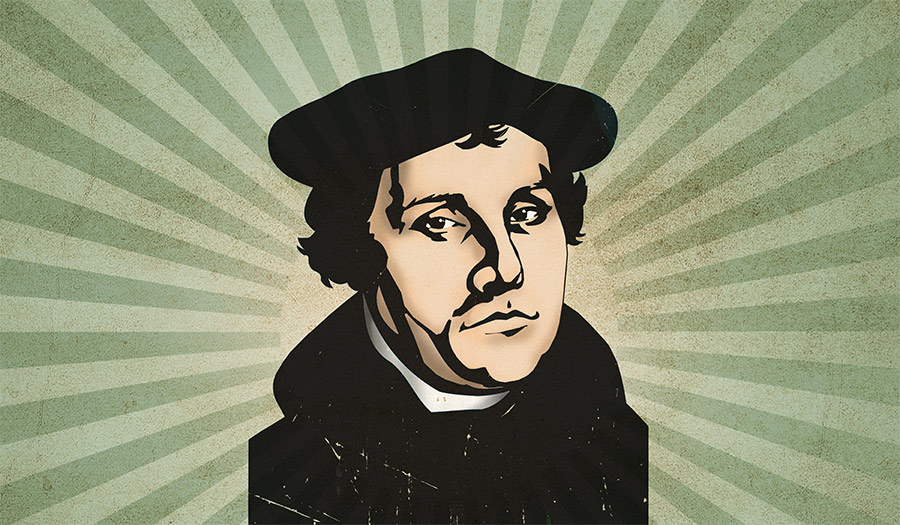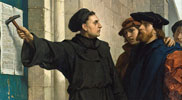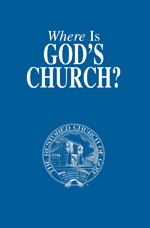
Article
Five hundred years after Martin Luther challenged the monolithic power of the Catholic Church, the effects of the movement he sparked continue.
Learn the why behind the headlines.
Subscribe to the Real Truth for FREE news and analysis.
Subscribe NowThe world changed forever on June 6, 2013. British newspaper The Guardian released the first files that began to reveal the scope of America’s National Security Agency spying program against its citizens and foreign nations.
Three days later, former intelligence employee Edward Snowden revealed himself as the source of the leaks, stating, “I have no intention of hiding who I am because I know I have done nothing wrong.”
Mr. Snowden felt morally compelled to expose what was unwittingly occurring around the world. This was one man going against the most powerful government history has ever seen.
The actions of this self-proclaimed whistleblower, and similar ones from organizations such as WikiLeaks, reveal a world in flux. We are in a transition period of history. This is a brave new world where ideas and opinions can be spread globally with a few strokes of a computer keyboard.
As of yet, those alive today cannot know what new world will emerge from this time of transition.
The actions of Mr. Snowden spawned countless results—good, bad and everything in between. Supporters of his actions feel he shined a noble spotlight on gross governmental overreach. Many detractors see the man as nothing more than a traitor, plain and simple.
Right or wrong, Edward Snowden owes a lot to the revolutionaries and whistleblowers who came before him—those who refused to back down no matter what.
 Getty Images
Getty ImagesYet there was one who started it all. While Mr. Snowden was born in 1983, there was another man born 500 years earlier in 1483: Martin Luther, the father of the Protestant Reformation. He too lived during a tumultuous period and stood up against the most powerful institution of his time, the Catholic Church. He used the relatively new technology of the printing press to spread his ideas. And we can know what effects his actions had.
Legend has it that, on October 31, 1517, Luther nailed his Ninety-five Theses to the door of the Wittenberg Castle Church. The monk had previously organized a debate to discuss corruption in the Catholic Church—namely the use of paid indulgences to forgive sins—but no one showed. Instead, he had his complaints printed and began distributing them.
What started as wanting to reform the Catholic Church quickly spawned countless denominations, armed revolts, and a new age. Ultimately, Luther’s fabled hammer blows echoed throughout time to shape the modern world.
Why Luther Succeeded
Luther, whom historians have called “the last medieval man and the first modern one,” was not the first to take on the Catholic Church. But he was the first to get away with it. Men like John Hus, a Czechoslovakian priest, took umbrage against Rome and was burned at the stake in 1415. Girolamo Savonarola stood up to the Vatican and was hung and his body burned in 1498.
According to Encyclopedia Britannica, one way Luther distinguished himself from previous reformers was while they “attacked corruption in the life of the church, he went to the theological root of the problem—the perversion of the church’s doctrine of redemption and grace.”
But this rogue monk was not a mythic figure that came out of nowhere. Rather, he was a product of his time.
The 11th edition of Britannica states that “the roots of the movement in which he was the central figure must be sought for in the popular religious life of the last decades of the 15th and opening decades of the 16th century—a field which has been neglected by almost all his biographers…Pious parents, whether among the burghers or peasants, seem to have taught their children a simple evangelical faith. Martin Luther and thousands of children like him were trained at home to know the creed, the ten commandments, the Lord’s prayer…”
“Alongside this we can trace the growth of another religious movement of a different kind. We can see a sturdy commonsense religion taking possession of multitudes in Germany, which insisted that laymen might rule in many departments supposed to belong exclusively to the clergy.”
“Lastly, the medieval Brethren were engaged in printing and distributing tracts, mystical, anti-clerical, sometimes socialist. All these influences abounded as Luther was growing to manhood and laid their marks upon him.”
There were also financial motives behind Luther’s success. Wealthy supporters and noblemen backed the Protestant cause because a decrease in the Vatican’s political and economic influence meant laymen could amass more wealth.
Yet the printing press most allowed for the Protestant movement to take hold. Before Johannes Gutenberg’s movable type printing press came in 1439, Rome had squelched out disagreeing ideas quickly and publicly. But everything changed when one person’s ideas could be spread by simply handing someone a leaflet. Ideas could spread like viruses until they became impossible to eradicate.
German Impact
Of course, Martin Luther’s teaching spawned the Lutheran Church. His actions made way for the Reformed, Anabaptist and Anglican denominations. But his impact was not just religious. His handprints remain on the German nation today.
A longer quote from The Economist summarizes the national impact of this one man: “Start with aesthetics. For Luther this was, like everything else, a serious matter. He believed that Christians were guaranteed salvation through Jesus but had a duty to live in such a way as to deserve it. Ostentation was thus a disgraceful distraction from the asceticism required to examine one’s own conscience. The traces of this severity live on in Germany’s early 20th-century Bauhaus architecture, and even in the furniture styles at IKEA (from Lutheran Sweden). They can be seen in the modest dress, office decor and eating habits of Angela Merkel, the daughter of a Lutheran pastor, and of Joachim Gauck, Germany’s president and a former pastor himself. Both may partake of the glitz of the French presidency while visiting Paris, but it would never pass in Berlin.
“Luther shared his distaste for visual ornament with other Protestant reformers. But he differed in the role he saw for music. The Swiss Protestants John Calvin and Huldrych Zwingli viewed music as sensual temptation and frowned on it. But to Luther music was a divinely inspired weapon against the devil. He wanted believers to sing together—in German, in church and at home, and with instruments accompanying them. Today Germany has 130 publicly financed orchestras, more than any other country. And concerts are still attended like sermons, somberly and seriously.
“Luther’s inheritance can also be seen in the fact that Germany, the world’s 17th-most populous country, has the second-largest book market after America’s. After he translated the Bible into German, Luther wanted everyone, male or female, rich or poor, to read it. At first Protestants became more literate than Catholics; ultimately all Germans became bookish.
“Finally, a familiar thesis links Luther to German attitudes towards money. In this view Catholics, used to confessing and being absolved after each round of sins, tend to run up debts (Schulden, from the same root as Schuld, or ‘guilt’), whereas Protestants see saving as a moral imperative. This argument, valid or not, has a familiar ring in southern Europe’s mainly Catholic and Orthodox countries, which have spent the euro crisis enduring lectures on austerity from Wolfgang Schauble, Germany’s devoutly Lutheran finance minister.”
Global Impact
Luther’s revolution has influence on nearly every facet of modern culture. Certainly, there are theological implications, but it also influenced law, ethics and the humanities.
Deutsche Welle reported: “‘Protestantism contributed largely to the development of the American nation and its self-image,’ say the [500-year Protestant anniversary] exhibition organizers in Berlin. ‘It impacted the idea of America as the Promised Land and of the Americans as the Chosen People.’”
According to the newspaper, “the phenomenal effect” of the Ninety-five Theses “quickly spread throughout the country. Luther probably became famous because the theses critical of the church were printed on a leaflet that was in circulation.”
Time expounded on the widespread impact of the Reformation: “Luther’s conviction that all men stand equally naked before God constitutes the theological substratum justifying liberal democracy. His teaching on ‘the two kingdoms’—that man with his soul belongs to the church, and his body to the world—contributed to the rise of the modern secular state. Luther’s conception of the ‘priesthood of all believers’ implied that man served God best in his daily existence—the basis of the Protestant ethic of work and achievement. His insistence that men must read God’s word contributed to the spread of literacy. And in his own translation of the Bible—a rendering whose only peers are the King James version and the Latin Vulgate—Luther wrote a German of poetry and power that has been matched only by Goethe himself. In effect, he created a common language for Germany, the necessary prelude to nationhood.”
In addition, the declining power of the Catholic Church allowed for further intellectual progress, which helped spur on the scientific revolution of the time. This movement included Galileo Galilei, Isaac Newton, and many other fathers of modern science.
Though Luther’s historical impact is without question, he was not without flaws. Spectator reported in a review of the book Martin Luther: Renegade and Prophet that he was at once a “charismatic, bruising, paradoxical and appalling Augustinian monk turned renegade.”
Though Time praised him for detailing his scriptural ideas with clarity and elegance, the magazine stated that “he was capable of a four-letter grossness of language. He was the archetype of individual Christian assertion; yet he could be brutally intolerant of dissent, and acquiesced in the suppression of those he considered heretics. Prayerful and beer-loving, sensual and austere, he was the least saintly, but most human, of saints.”
Luther’s image is also tarnished by his anti-Semitic writings that were later used by the Hitler-era Nazis to espouse their Final Solution.
The paradoxical father of Protestantism gave rise to a host of effects both good and bad—but most of them were unintended.
Tumultuous Change
The theological revolution quickly gave way to political bloodshed. In 1524, the German Peasants’ War began when peasants and farmers went against the aristocracy. One cause of this war was interpreting the teachings of Jesus Christ to support socialist ideologies. Up to 100,000 lost their lives in the short-lived conflict.
Violent clashes between Catholics and Protestants were another result of the Reformation. The Thirty Years’ War (1618-1648) was born out of tensions between the two Christian groups. When the Treaty of Westphalia ended the conflict, eight million had been killed.
All in all, the decades after 1517 were filled with tumultuous change, but slowly, the modern world appeared. Europe became increasingly secular. Britain split from the Catholic Church, started Anglicanism, and grew into a global empire. America—built largely on Protestant ideals—became the most influential nation of all time.
Yet years of relative global stability are at an end. Political order is again shifting. While there has been armed conflict throughout the years, it used to be a relatively simple “us versus them.” Think of Axis and Allies in World War II, or U.S. versus Soviet Union during the Cold War.
Today is not so simple. The global war on terror has sparked a period in which attacks can come from anywhere at any time. As stability wanes, the number of impossible situations continues to grow: North Korea’s escalating nuclear program, Ukraine’s civil war, ISIS, Syria’s war and refugee crisis, and China flexing its muscles in the South China Sea.
All of this is occurring in a world where power is more evenly distributed and borders are increasingly meaningless. A new world is being born.
As has happened ever since the Bible was printed in the common tongue, many today read certain prophecies it contains and attempt to apply it to world conditions.
One popular passage to lean on is Jesus’ Olivet prophecy in Matthew 24, Mark 12, and Luke 21. This speaks of “wars and rumors of wars” to occur at the “end of the age,” right before Christ’s return.
Yet there is a problem with attempting to tie current events with what is written in the Bible. Self-proclaimed prophecy experts constantly disagree and offer up competing ideologies.
How can you know who is right? Is prophecy even something worth investigating?
Even 500 years after the start of the Reformation, one of Luther’s main hopes remains utterly unfulfilled—that everyone could read God’s Word and come together in agreement.
Time magazine explained: “Even after the break with Rome, church historians agree, Luther wanted only to reform the one true church—and not to found a new Lutheran denomination. With that in mind, many contemporary theologians agree that he could hardly fail to be displeased by much of the present condition of the churches.”
One or Many?
Luther hoped that getting a Bible in the laps of commoners would lead to everyone reading Scripture and coming to the same conclusions. Again, this hope has utterly failed.
Look at just Lutherans in the United States. The three main synods are the Evangelical Lutheran Church in America, the Lutheran Church Missouri Synod, and the Wisconsin Evangelical Lutheran Synod. ELCA takes a liberal view that women can be ordained, does not condemn homosexuality, and believes the Bible should not always be taken literally. LCMS is somewhere in the middle. It condemns same-sex relations and believes God’s Word is literal. WELS is the most conservative and does not even recognize the other two synods as Lutherans.
Now take the 10,000-foot view. There are an estimated 33,000 separate Christian groups around the globe—each with their own ideas and interpretations of Scripture.
Ask yourself, is this what God intended? Be honest!
Real Truth Editor-in-Chief David C. Pack addressed this question in Where Is God’s Church?
“Jesus Christ declared, ‘I will build My Church’ (Matt. 16:18). No matter how men interpret it, this passage speaks of a single church! Christ continued, ‘and the gates of hell [the grave] shall not prevail against it.’ He promised that His Church could never be destroyed.
“Over 2,000 different professing Christian church organizations have been ‘built’ by men in the United States. Another is started every three days. Estimates place the number of professing Christians at more than two billion. While church attendance seems to be increasing, it is not increasing as fast as the confusion surrounding the question of which is the right church.
“While it has been said, ‘They can’t all be wrong,’ it is more correct to say, ‘They cannot all be right.’ If Christ built His Church as He said, then it can be found somewhere on earth today—and it is the only right Church. But we must ask: How do we find it—what do we look for—how do we identify it—how do we know it if we see it?”
Mr. Pack continued: “Your Bible declares, ‘God is not the author of confusion, but of peace, as in all churches of the saints [the context shows this refers to all congregations of the true Church, not all organizations of men]’ (I Cor. 14:33).
“God’s Church (composed of many congregations of saints) was to reflect peace—not confusion. You need not be confused about the identity of the true Church. God commands, ‘Prove all things; hold fast that which is good’ (I Thes. 5:21). While this certainly refers to scriptural matters (not the car you drive or house you buy), it does say that ‘ALL things,’ not ‘some things,’ should be proven! Surely God would not exclude something of such magnitude—such vital importance—as the matter of where His true Church is found. And He would never emphatically tell people to prove things that cannot be proven!”
Five hundred years after Martin Luther stood up to the Catholic Church, his greatest impact was making way for thousands of disagreeing and competing groups. Yet God says there is one Church on Earth—and the Bible provides the clues so that you can locate it today.
Read the rest of the life-changing booklet Where Is God’s Church?



